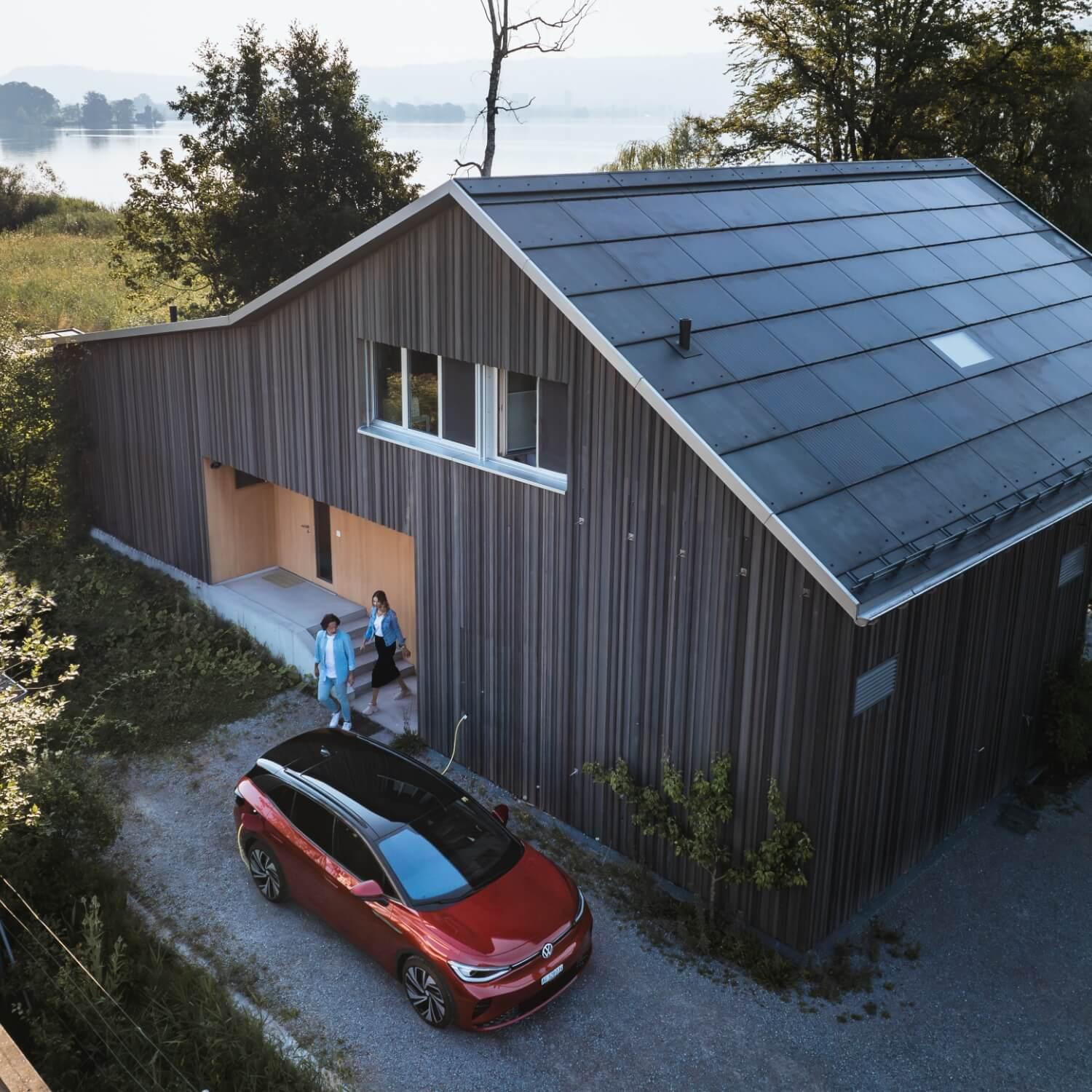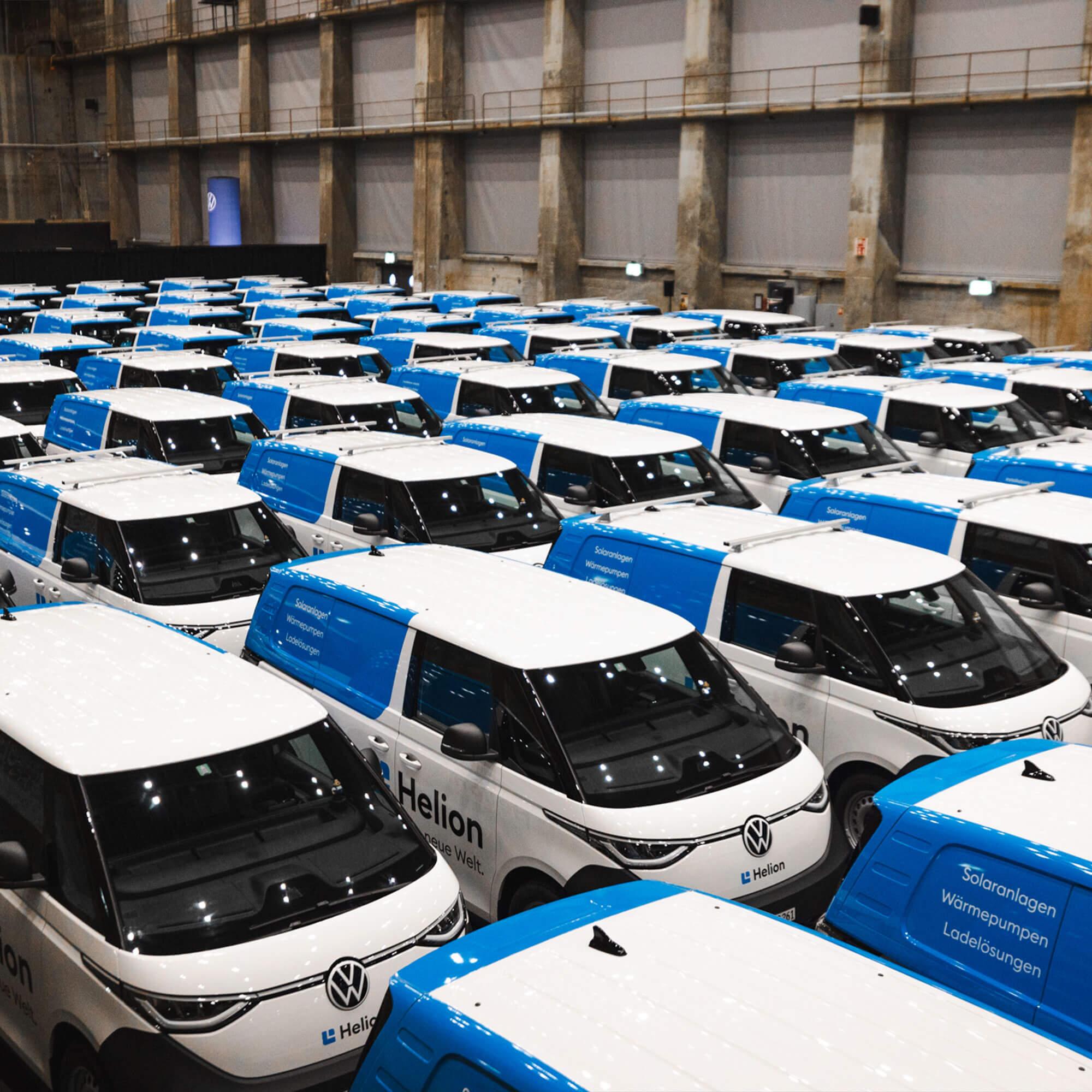The future of mobility is electric.

Mobility solutions from a single source.
Clyde bridges the gap between e-mobility and solar power, closing the energy cycle for a more sustainable tomorrow. Together with our partners, we are driving forward the mobility and energy revolution.
Why charging your car with your own power is better.
Reduce energy costs
Rather than being tied to charging stations and rising energy prices, charge your EV cheaply and emission-free at home – to cut energy costs and be self-sufficient.

PV pays for itself
The income you receive for charging at home (30 cents per kWh) means your PV system pays for itself more quickly, i.e. after 8 years instead of 11.

Professional advice
Any questions about e-mobility, charging at home or the PV system? Thanks to our partnerships, we have top experts who will be happy to advise you
Wide range of vehicles – from family-friendly to luxurious
We have the latest electric car models. Electrifying and packed with power for private or business use. Find the right vehicle for you and maximise your driving pleasure with emission-free mobility.
Together we have more power.

Helion – energy for a new world
Are you a homeowner and a fan of electric mobility? Charge your e-car at home with your PV system and wallbox.

Solarify – an investment that pays off
Investing sustainably in solar energy? More demand means more PV systems built. Locally produced solar energy is the way ahead

3S – sustainable and independent power supply
Renovation or new build – why not equip your home with solar power and use it for your electric car? Modules for the roof, façade or railings.

Clyde x Helion
With Helion, we offer a holistic e-mobility solution for charging on the move, at home or in the office. The charge:ON app provides an overview of charging purchases and the total bill, making charging easy. It also covers production and use of your own solar power. Having your own PV system means you benefit twice. We pay you 0.30 CHF per kWh for charging at home – much more than local energy suppliers offer.
Sustainable investment.
Buy solar panels and be part of the energy revolution – even if you don’t own your home.

Powered by the sun.
Travel silently and smoothly from A to B by subscribing to a Clyde e-car.

Clyde x 3S
3S develops and produces solar modules in Switzerland – for roofs, façades and balcony railings. Thanks to production in Switzerland, 3S helps ensure a better environmental balance, making it part of the energy revolution. A PV system also reduces energy costs and increases the value of the property.
Close the energy loop.
Electric travel with self-generated electricity – as sustainable as it gets.
Electric car x photovoltaic system
Not only can you charge your car independently of public charging stations and rising electricity prices, you also charge more cheaply and emission-free. By increasing the electricity consumption, you are increasing your own consumption and, as a result, the profitability of your photovoltaic system. Surplus electricity is only fed back into the grid when your battery is fully charged. In addition, your own solar electricity is up to 12 cents cheaper per kilowatt hour in Switzerland than electricity from the grid, so an electric car powered by solar electricity has less of an impact on your electricity costs.
The rule of thumb says one kWp per 1,000 kilometres of driving, which is about two to three panels. But please note: that does not mean that this is the only criterion for the size of your photovoltaic system, since there are also other power-hungry consumers in the house. Basically, the recommendation is to cover the entire roof. The basic costs of an installation (administration, scaffolding, etc.) are always the same. The larger the photovoltaic system, the quicker it will pay for itself. It is also better to make full use of the roof with a view to the future, because electricity consumption will tend to increase (mobility, heating, etc.) and electricity costs are currently increasing rather than decreasing.
A PV system can be installed on a small roof of a single-family house for as little as CHF 19,500 (including subsidies and tax savings). This is a guideline only, because various factors can influence the price, such as the size of the roof and the output, the choice of solar modules, material costs and scaffolding (including the fuse box). In addition, the type of building, the size of your household and your electricity requirements also play a part. Click here for Helion’s cost overview or to view the detailed solar calculator.
Starting at around CHF 2,500, you can get a home charging station including the installation costs. However, the costs vary depending on the length of the connection cable, car make and model, number of parking spaces to be equipped, building type and parking area. Click here for the charging station calculator.
The charging time of your electric car depends on three factors:
1. Kilometres travelled per day
2. Charging power of the charging station
3. Charging technology of the car
The charging speed depends on the number of kilometres driven per day. The fewer kilometres you have travelled with the electric vehicle, the less the battery needs to be recharged.
Calculation formula for the charging time: charging time = battery capacity in kWh/charging power (kW)
Household socket up to 3.7 kW 8–14 hours
Charging station/wallbox 3.6 to 22 kW 2–6 hours
Are you a homeowner with a photovoltaic system installed on your roof? Then you can expect twice the benefits: by charging your electric car using your own PV system, you can double the rate you normally receive for your photovoltaic electricity (based on the mean electricity price in Switzerland). We will reimburse you CHF 0.30/kWh for electricity charged at home – significantly more than the rate offered by local electricity suppliers. This means your PV system can become an attractive investment faster thanks to Clyde. You can find out more about the Clyde Energy Benefit here.
With the Helion ONE app, you can optimise your own consumption flexibly and profitably. By means of networked and remotely controllable devices and installations, you can not only control the lights or access to your home. The devices use your solar power more efficiently and always keep an eye on your electricity consumption – be it for charging your electric car, for heating the house or for heating water.
Towards an electrified future.
